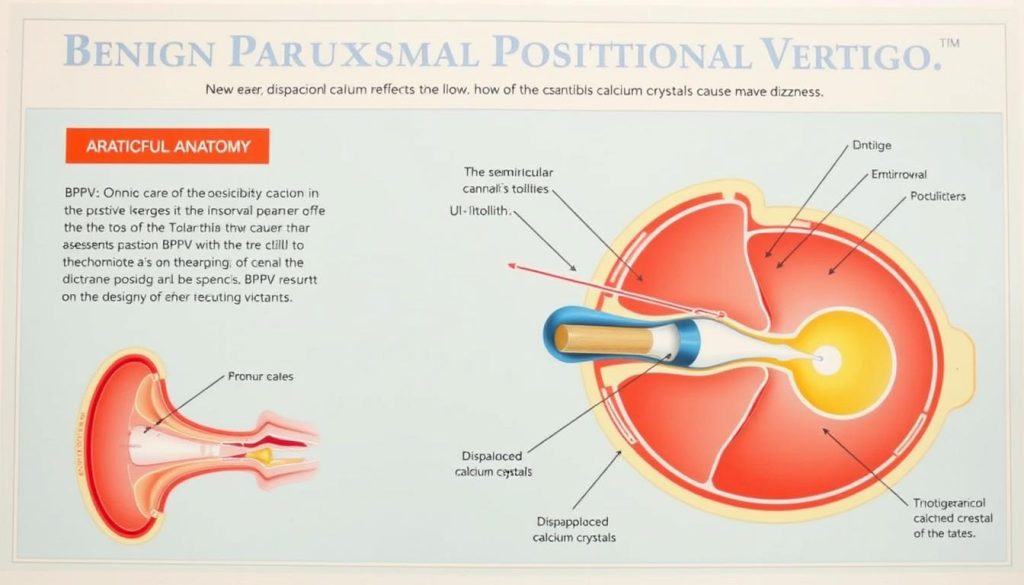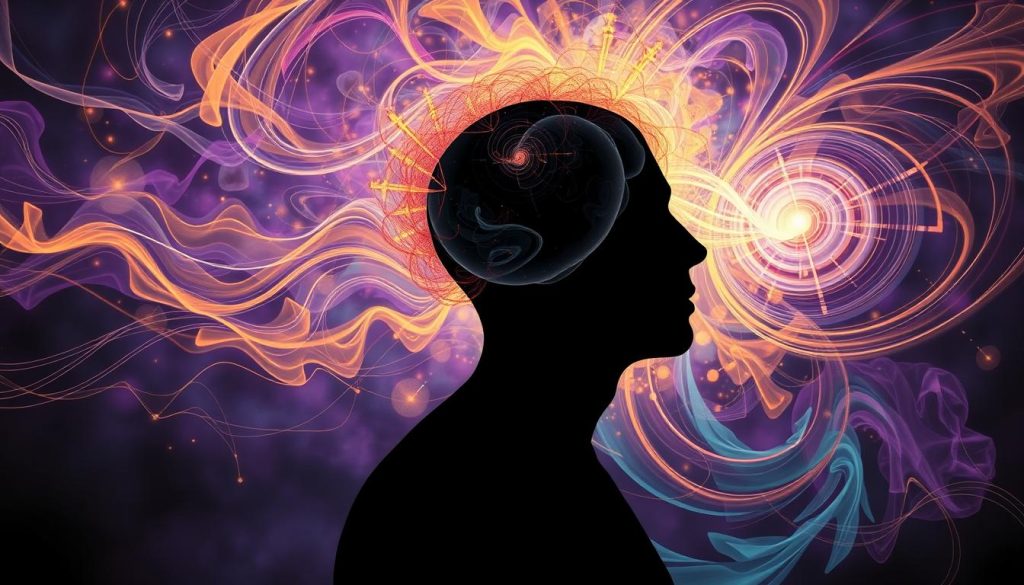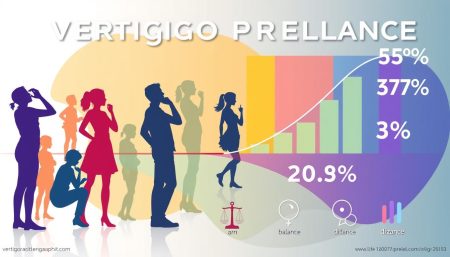Vertigo attacks can make your world spin around. They affect millions, making them search for answers. Knowing what causes these attacks is key to managing symptoms.
Many things can trigger vertigo, like inner ear problems or lifestyle choices. Symptoms include feeling like you’re spinning, trouble balancing, and nausea. This article will explore common causes and how to manage them.
Learning about vertigo attacks can help you take control. Whether you face occasional or ongoing dizziness, knowing the causes is the first step. It’s the path to finding the right treatment and getting your balance back.
Understanding the Vestibular System and Balance Control
The vestibular system is key to keeping us balanced and aware of our space. It’s in the inner ear and works with other senses to keep us stable. Let’s dive into how it works and why it’s so important for everyday life.
Anatomy of the Inner Ear
The inner ear has special parts that help us balance. The semicircular canals and otolith organs are crucial. They detect movement and changes in gravity. Together, they help us stay balanced.
How Balance is Maintained
Keeping balance is a team effort. The vestibular system, eyes, and muscles all send signals to the brain. This feedback helps us adjust quickly to stay steady. If any part of this system fails, we might struggle with balance.
Role of Sensory Input in Balance
Different senses play a big role in balance. Our eyes tell us about our surroundings. Our muscles and joints tell the brain where we are. The vestibular system adds details about head movement. Any problem in these areas can cause balance issues.
| Sensory System | Function | Impact on Balance |
|---|---|---|
| Visual | Provides environmental cues | Helps orient body in space |
| Proprioceptive | Senses body position | Aids in posture control |
| Vestibular | Detects head movement | Stabilizes gaze and posture |
Knowing how these systems work helps us understand and treat balance problems. By understanding the vestibular system, doctors can help people with balance issues and inner ear problems.
What Causes Vertigo Attacks: Primary Triggers and Risk Factors
It’s important to know what causes vertigo attacks to prevent and manage them well. Vertigo makes you feel like you’re spinning. It often comes from problems in the inner ear.
Benign Paroxysmal Positional Vertigo (BPPV) is a common cause. It happens when tiny crystals in the inner ear move out of place. This can make you dizzy, especially when you move your head.
Vestibular neuritis is another cause. It’s an inflammation of the balance nerve in the inner ear. This can cause vertigo that lasts for days or weeks. Meniere’s disease, which makes fluid build up in the inner ear, also causes vertigo attacks.
- Migraines
- Head injuries
- Certain medications
- Stress and anxiety
These things can make you more likely to have vertigo. To prevent it, try to manage stress, eat well, and exercise. Avoid sudden head movements and get enough sleep to reduce vertigo attacks.
Older people are more likely to get vertigo, especially BPPV. If you’ve had ear infections or head injuries, you might be more at risk too. Knowing what causes vertigo helps you find ways to prevent and manage it.
Benign Paroxysmal Positional Vertigo (BPPV) Explained
BPPV is a common cause of vertigo, causing sudden dizziness when you move your head. It happens when tiny calcium crystals in your inner ear get dislodged. This affects your balance system.

Common Symptoms of BPPV
People with BPPV often have brief episodes of vertigo. These episodes can last from seconds to minutes. The dizziness can be triggered by:
- Rolling over in bed
- Tilting your head back
- Bending forward
Diagnostic Procedures
Doctors diagnose BPPV through physical exams and special tests. The Dix-Hallpike test is often used. It involves moving your head into different positions to check your eye movements.
Treatment Options for BPPV
The main treatment for benign paroxysmal positional vertigo is repositioning maneuvers. These methods try to move the crystals back to their right place in the inner ear.
- Epley Maneuver: Most effective for posterior canal BPPV
- Semont Maneuver: An alternative to the Epley
- Home Exercises: Can be taught for self-treatment
In rare cases, surgery might be needed if these methods don’t work. Knowing about BPPV and its treatments can help manage symptoms. It can also improve your quality of life.
Inner Ear Infections and Vestibular Neuritis
Inner ear problems can cause severe vertigo. These issues often come from infections or inflammation in the vestibular system. Knowing the causes and symptoms is key for the right diagnosis and treatment.
Vestibular neuritis is a common inner ear disorder. It causes sudden, intense vertigo. This happens when the vestibular nerve gets inflamed, messing up balance signals to the brain. People may feel nauseous, dizzy, and have trouble focusing their eyes.
Inner ear infections, or labyrinthitis, can also cause vertigo. These infections hit the labyrinth, a part of the inner ear that deals with balance and hearing. Symptoms include vertigo, hearing loss, and tinnitus.
Recognizing Vestibular Disorder Symptoms
- Severe dizziness or spinning sensation
- Nausea and vomiting
- Balance problems
- Hearing changes
- Visual disturbances
Seeing a doctor quickly is important when you have these symptoms. Doctors will do tests to find out why you’re feeling dizzy. These tests might include balance tests, hearing exams, and imaging studies.
| Condition | Main Symptoms | Treatment Options |
|---|---|---|
| Vestibular Neuritis | Sudden vertigo, nausea, balance issues | Vestibular rehabilitation, anti-inflammatory drugs |
| Labyrinthitis | Vertigo, hearing loss, tinnitus | Antibiotics (if bacterial), antivirals, vestibular exercises |
Treatment for these inner ear problems usually involves medicine and vestibular rehabilitation exercises. Sometimes, symptoms go away with time and care. But, it’s important to see a doctor to make sure there’s no serious issue and get the right treatment.
Meniere’s Disease as a Vertigo Trigger
Meniere’s disease is a complex inner ear disorder. It can cause severe vertigo attacks and balance problems. This condition affects the vestibular system, leading to unpredictable episodes of dizziness and hearing issues.
Symptoms and Progression
Meniere’s disease develops in stages. Symptoms vary in intensity over time. Common signs include:
- Recurring vertigo episodes
- Fluctuating hearing loss
- Tinnitus (ringing in the ears)
- Feeling of fullness in the affected ear
These symptoms can greatly impact daily life. Vertigo causes and treatment become a top concern. As the disease progresses, vertigo attacks may worsen, leading to persistent balance problems.
Managing Meniere’s Disease
There’s no cure for Meniere’s disease, but various treatment options can help manage symptoms. These may include:
- Medications to control vertigo and reduce fluid retention
- Vestibular rehabilitation exercises
- Hearing aids for managing hearing loss
- In severe cases, surgical interventions may be considered
Lifestyle Modifications
Adopting certain lifestyle changes can help alleviate symptoms and improve quality of life for those with Meniere’s disease:
| Modification | Potential Benefits |
|---|---|
| Low-salt diet | Reduces fluid retention, minimizing inner ear pressure |
| Stress management | Lowers risk of triggering vertigo attacks |
| Avoiding caffeine and alcohol | Helps maintain inner ear fluid balance |
| Regular sleep patterns | Improves overall balance and reduces fatigue |
By combining medical treatments with lifestyle adjustments, many individuals with Meniere’s disease can manage their symptoms. Regular check-ups with a healthcare provider are crucial for monitoring the condition and adjusting treatment plans as needed.
The Connection Between Migraines and Vertigo
Migraines and vertigo often go together, making life tough for those who have them. Many people with migraines feel dizzy, which makes it hard to tell them apart. Knowing how they connect can help manage both better.

Vestibular migraines are a special kind of migraine that can cause severe vertigo. These episodes can last from minutes to days, making people feel very dizzy and off balance. It’s important to know the signs of vestibular migraines to get the right treatment.
“Vestibular migraines can be as debilitating as traditional migraines, with the added challenge of balance disturbances.”
To diagnose migraine-related vertigo, doctors look at symptoms and medical history. They might ask you to keep a diary of your vertigo and migraine attacks. This helps find patterns and what might trigger dizziness.
There are treatments for vertigo linked to migraines:
- Preventive medications to reduce migraine frequency
- Vestibular rehabilitation exercises
- Lifestyle changes to avoid triggers
- Stress management techniques
By treating both vertigo and migraines at the same time, people can feel a lot better. Working with healthcare providers to create a treatment plan is crucial. This way, you can manage these conditions well together.
Environmental and Lifestyle Triggers for Vertigo
Understanding what causes vertigo attacks can help you manage symptoms and prevent future episodes. Environmental factors and lifestyle choices play a big role in triggering vertigo. Let’s explore how stress, diet, and sleep patterns impact vertigo and discover effective vertigo prevention tips.
Stress and Anxiety Impact
Stress and anxiety can make vertigo symptoms worse. When you’re stressed, your body releases hormones that can affect your balance system. To reduce stress-related vertigo:
- Practice relaxation techniques like deep breathing or meditation
- Exercise regularly to release endorphins
- Seek support from friends, family, or a therapist
Dietary Considerations
Certain foods and drinks can trigger vertigo attacks. Be mindful of your diet and consider these vertigo prevention tips:
- Limit caffeine and alcohol intake
- Reduce salt consumption to manage fluid balance
- Stay hydrated with water throughout the day
- Avoid foods high in tyramine, like aged cheeses and cured meats
Sleep Patterns and Vertigo
Poor sleep can disrupt your balance system and trigger vertigo. Improve your sleep habits with these strategies:
- Maintain a consistent sleep schedule
- Create a relaxing bedtime routine
- Avoid screens before bed
- Ensure your sleeping environment is dark and quiet
| Trigger | Impact on Vertigo | Prevention Tips |
|---|---|---|
| Stress | Increases hormone release, affecting balance | Practice relaxation techniques, exercise regularly |
| Diet | Certain foods can trigger or worsen symptoms | Limit caffeine, alcohol, and high-sodium foods |
| Sleep | Poor sleep disrupts the balance system | Maintain consistent sleep schedule, create bedtime routine |
By addressing these environmental and lifestyle factors, you can reduce the frequency and severity of vertigo attacks. Remember, what causes vertigo attacks varies for each person, so pay attention to your triggers and adjust your habits accordingly.
Medication-Induced Vertigo and Side Effects
It’s important to know about vertigo causes and treatments, especially when it’s caused by medication. Many drugs can lead to vertigo, so it’s key to watch out for these side effects.
- Antidepressants
- Blood pressure medications
- Anticonvulsants
- Antianxiety drugs
- Certain antibiotics
If you feel dizzy after starting a new medicine, talk to your doctor right away. They might change your dosage or find another treatment. This can help reduce your vertigo symptoms.
| Medication Type | Potential Vertigo Triggers | Management Strategies |
|---|---|---|
| Antidepressants | Dizziness, lightheadedness | Gradual dose adjustment, switching to a different class |
| Blood pressure drugs | Postural hypotension | Monitoring blood pressure, adjusting dosage |
| Anticonvulsants | Balance issues, vertigo | Regular check-ups, alternative medications |
| Antianxiety medications | Drowsiness, dizziness | Reducing dosage, exploring non-pharmacological options |
Dealing with vertigo caused by medication often needs a few steps. Your doctor might suggest taking your meds at different times or changing your diet. They might also recommend exercises to help with balance. Always follow your doctor’s advice when changing your medication.
Emergency Signs: When to Seek Medical Attention
Vertigo can be scary, but knowing when to get help is key. Some signs demand quick action. Let’s look at red flags, tests, and treatments for severe cases of vertigo.
Red Flag Symptoms
Watch out for these danger signs with vertigo: sudden, bad headaches, vision changes, or trouble speaking. These could point to serious vestibular disorder symptoms. If you can’t walk or feel very weak, don’t wait. Seek help right away.
Diagnostic Tests
Doctors use special tests to find vertigo causes and treatment options. They might do brain scans or check your eye movements. Blood tests can spot infections. These help pinpoint why you’re feeling off-balance.
Treatment Protocols
For urgent vertigo cases, doctors act fast. They may give meds to ease symptoms or treat underlying issues. In rare cases, surgery might be needed. The goal is to stop vertigo quickly and safely. Remember, prompt care is vital for severe vestibular problems.
FAQ
Q: What are the most common causes of vertigo attacks?
A: Vertigo attacks often come from Benign Paroxysmal Positional Vertigo (BPPV), inner ear infections, and Meniere’s disease. Vestibular neuritis and migraines also play a role. Stress, some medications, and environmental factors can trigger vertigo too.
Q: How does the vestibular system maintain balance?
A: The vestibular system keeps us balanced by working with the eyes and body sensors. The inner ear’s canals detect head movements. The eyes add visual input. The brain then uses all this info to keep us steady and oriented.
Q: What are the symptoms of Benign Paroxysmal Positional Vertigo (BPPV)?
A: BPPV causes brief dizziness or a spinning feeling when you move your head. You might also feel nauseous, lose balance, or feel unsteady. These episodes can be very intense and last from seconds to a minute.
Q: How is Meniere’s disease related to vertigo?
A: Meniere’s disease is linked to vertigo because it affects the inner ear. It causes vertigo, hearing changes, tinnitus, and ear fullness. Vertigo attacks from Meniere’s can last from 20 minutes to hours.
Q: Can migraines cause vertigo?
A: Yes, migraines can lead to vertigo. This is called vestibular migraine or migraine-associated vertigo. People with it might feel dizzy, unbalanced, or have vertigo before, during, or after a headache. Some may even have these symptoms without a headache.
Q: What lifestyle factors can trigger vertigo attacks?
A: Stress, anxiety, lack of sleep, dehydration, and certain foods can trigger vertigo. Caffeine, alcohol, and high-sodium foods are especially bad for those prone to vertigo.
Q: Can medications cause vertigo?
A: Yes, some medications can cause or worsen vertigo. This includes antibiotics, blood pressure meds, antidepressants, and anti-seizure drugs. If you think your meds are causing vertigo, talk to your doctor before changing anything.
Q: When should I seek immediate medical attention for vertigo?
A: Get medical help right away if you have severe headache, chest pain, trouble breathing, sudden weakness, slurred speech, or loss of consciousness. These signs could mean a serious problem that needs quick attention.
Q: How is vertigo diagnosed?
A: Doctors diagnose vertigo by looking at your medical history, doing a physical exam, and running tests. They might use the Dix-Hallpike test for BPPV, audiometry, videonystagmography, and imaging like MRI or CT scans to find the cause.
Q: What are some effective treatments for vertigo?
A: Treatment for vertigo varies based on the cause. It might include repositioning maneuvers for BPPV, exercises, medications, or lifestyle changes. Sometimes, surgery is needed for severe or ongoing vertigo.


















